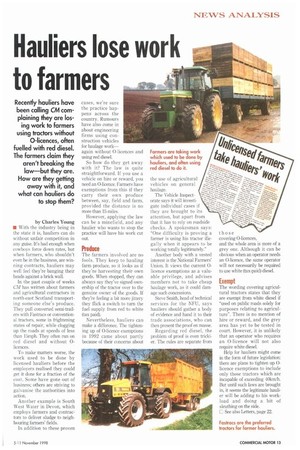• With the industry being in the state it is,
Page 15

If you've noticed an error in this article please click here to report it so we can fix it.
hauliers can do without unfair competition in any guise. It's bad enough when cowboys force down rates, but when farmers, who shouldn't even be in the business, are winning contracts, hauliers may well feel they're banging their heads against a brick wall.
In the past couple of weeks CM has written about farmers and agricultural contractors in north-east Scotland transporting someone else's produce. They pull converted semi-trailers with Fastracs or conventional tractors, some in frightening states of repair, while clogging up the roads at speeds of less than 15mph. They often run on red diesel and without 0licences.
To make matters worse, the work used to be done by licensed hauliers before the employers realised they could get it done for a fraction of the cost. Some have gone out of business; others are striving to galvanise the authorities into action.
Another example is South West Water in Devon, which employs farmers and contractors to deliver sludge to neighbouring farmers' fields.
In addition to these proven cases, we're sure the practice happens across the country. Rumours have also come in about engineering firms using construction vehicles for haulage work— again without 0-licences and using red diesel.
So how do they get away with it? The law is quite straightforward. If you use a vehicle on hire or reward, you need an 0-licence. Farmers have exemptions from this if they carry their own produce between, say, field and farm, provided the distance is no more than 15 miles.
However, applying the law can be a minefield, and any haulier who wants to stop the practice will have his work cut out.
Produce
The farmers involved are no fools. They keep to hauling farm produce, so it looks as if they're harvesting their own goods. When stopped, they can always say they've signed ownership of the tractor over to the genuine owner of the goods. If they're feeling a bit more jittery they flick a switch to turn the fuel supply from red to white (tax paid).
Nevertheless, hauliers can make a difference. The tightening up of 0-licence exemptions in 1992 came about partly because of their concerns about the use of agricultural vehicles on general haulage.
The Vehicle Inspectorate says it will investigate individual cases if they are brought to its attention, but apart from that it has to rely on roadside checks. A spokesman says: "One difficulty is proving a farmer is using his tractor illegally when it appears to be working totally legitimately."
Another body with a vested interest is the National Farmers' Union. It views the current 0licence exemptions as a valuable privilege, and advises members not to take cheap haulage work, as it could damage such concessions.
Steve Smith, head of technical services for the NFU, says hauliers should gather a body of evidence and hand it to their trade associations, who can then present the proof en masse.
Regarding red diesel, the problem of proof is even trickier. The rules are separate from
• .'*1.,:z..17;;
those covering 0-licences, and the whole area is more of a grey one. Although it can be obvious when an operator needs an 0-licence, the same operator will not necessarily be required to use white (tax-paid) diesel.
Exempt
The wording covering agricultural tractors states that they are exempt from white diesel if "used on public roads solely for purposes relating to agriculture". There is no mention of hire or reward, and the grey area has yet to be tested in court. However, it is unlikely that an operator who requires an 0-licence will not also require white diesel.
Help for hauliers might come in the form of future legislation: there are plans to tighten up 0licence exemptions to include only those tractors which are incapable of exceeding 40km/h. But until such laws are brought in, it seems the legitimate haulier will be adding to his workload and doing a bit of sleuthing on the side.
C See also Letters, page 22.


























































































































